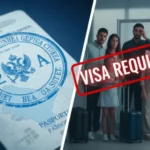Montenegro Stops Visa-Free Travel for Turkish Citizens After Violence in Capital
Montenegro has introduced a major policy change, temporarily stopping visa-free access for Turkish citizens. This vital decision, announced by Prime Minister Milojko Spajić, follows a series of violent incidents in the capital, Podgorica. These incidents led to public unrest and raised serious concerns over national security and organized crime. The move immediately affects Turkish travel and signals a stronger stance on border control and immigration policy. This article explains the reasons for the suspension, how it started, and what it means for future Montenegro travel for Turks and the country’s security.
Main Reasons for Ending the Travel Exemption
The government’s decision to end the visa exemption for Turkey citizens was primarily based on an urgent need to protect national security and uphold its commitment to the EU. Prime Minister Milojko Spajić confirmed the emergency action, stating it was necessary to “improve how we track foreigners entering and staying.” The two main causes behind this change are the security fallout from a violent incident and the country’s EU accession goals.
Read Also: Saudi eVisa vs. Visa on Arrival Rules Options for 2025
1. The Violent Incident and Public Safety Crisis
The immediate trigger for suspending the visa policy was a violent disagreement and the resulting public unrest in Podgorica.
- Zabjelo Stabbing: Man Arrested After Violent Attack: The violence began on the night of October 25 in the Zabjelo neighborhood. During the fight, Turkish nationals allegedly harassed and wounded a 25-year-old Montenegrin citizen (M.J.). The victim’s injuries were not life-threatening.
- Community Damage and Vandalism: The incident caused a public scandal, leading local residents to protest. The situation became unstable, with demonstrators repeating anti-Turkish slogans. Turkish property was targeted: a Turkish-owned restaurant had its windows destroyed, and two vehicles with Turkish license plates were damaged.
- Rapid Police Deployment and Detentions: Police acted quickly, resulting in multiple arrests. Two defendants, a Turkish citizen and an Azerbaijani citizen, were arrested in connection with the attack. Authorities also arrested 45 Turkish and Azerbaijani nationals for immigration violations, ordering the deportation of eight and fining seven others. This operation highlighted a link between the easy entry privilege and issues of illegal residency and public disorder.
This public safety crisis demonstrated a critical security gap, making the suspension of the former travel rule an immediate government action to regain control.
Read Also: Big Changes to the UK Student Visa System in 2025
Strategic Measures for Organized Crime and EU Integration
The decision to end the visa-free policy for Turkey citizens is not just a reaction but a strategic move tied to national security and international policy.
2. Rising Threat of Foreign Organized Crime
Montenegro’s security institutions have cited a serious concern about the growing influence of organized crime groups (OCGs) operating within its borders. According to the government’s official review of danger from serious and organized crime (SOCTA), foreign groups, particularly Turkish, Georgian, and Russian nationals, have become increasingly active.
The involvement of Turkish nationals in the recent violent incidents strengthened the government’s concern that the previous visa-free system was being misused by criminal elements. By suspending this privilege, the government aims to implement a stronger border security system to better screen and prevent the entry of individuals connected to organized crime.
3. Fulfilling European Union Requirements
Montenegro is an official candidate for European Union (EU) membership, and its government policies must align with the EU’s common criteria. The European Commission has continually stressed that Montenegro must reestablish visas for certain countries whose citizens can travel without a visa. Turkey is one of the nations on this list.
- Policy Inconsistency: The previous visa exemption for Turkish citizens was a constant source of criticism from Brussels because most EU members require Turkish citizens to get a visa.
- Political Progress: The suspension of visa access is a major step toward meeting this key EU requirement, showing Brussels that Montenegro is serious about aligning its external border controls with future common European policy. This is essential for the country’s progress toward full EU association.
Read Also: Dubai Golden Visa Expands to Include Exceptional Educators
Diplomatic and Traveler Implications
The temporary suspension has immediate consequences for thousands of travelers and requires careful diplomatic management.
Impact on Turkish Travelers
The temporary visa suspension means that Turkish travelers must now secure a visa before they visit Montenegro. This change cancels the previous rule that allowed them to stay for up to 90 days visa-free within 180 days.
The government took the following steps to manage the change:
- The Ministry of Foreign Affairs received instructions to establish a quick visa application process for Turkish nationals.
- The decision takes into account the approximately 14,000 Turkish nationals already residing in Montenegro.
Diplomatic Dialogue and Future Steps
The historic diplomatic and economic partnership remains despite the current tension. Turkish and Montenegrin officials have maintained continuous contact. The Turkish Foreign Ministry’s goal is to guarantee the safety and protection of Turkish nationals’ rights in Montenegro.
Montenegro’s Prime Minister Spajić has emphasized that the measure is temporary and that the government will begin in-depth talks with Turkey to find a mutually beneficial solution that protects both economic activity and good relations. High-level talks are expected soon.
The next diplomatic steps will determine how long the visa suspension will last and what new, mutually agreed-upon security mechanisms might replace the former arrangement, allowing visa-free travel to possibly resume in an adapted form in the future.
Conclusion
The temporary halt of the visa-free policy signals a significant shift in Montenegro’s immigration strategy. Driven by a violent local incident and ongoing worries about foreign organized crime, the decision shows a government determined to assert control over its borders and ensure public safety. It also serves the political purpose of coordinating Montenegro’s policies with EU criteria.
While the future of easy travel to Montenegro for Turks is now uncertain, both countries are committed to finding a solution. The next round of diplomatic talks will determine how Montenegro balances its internal security concerns with its critical international partnerships.











